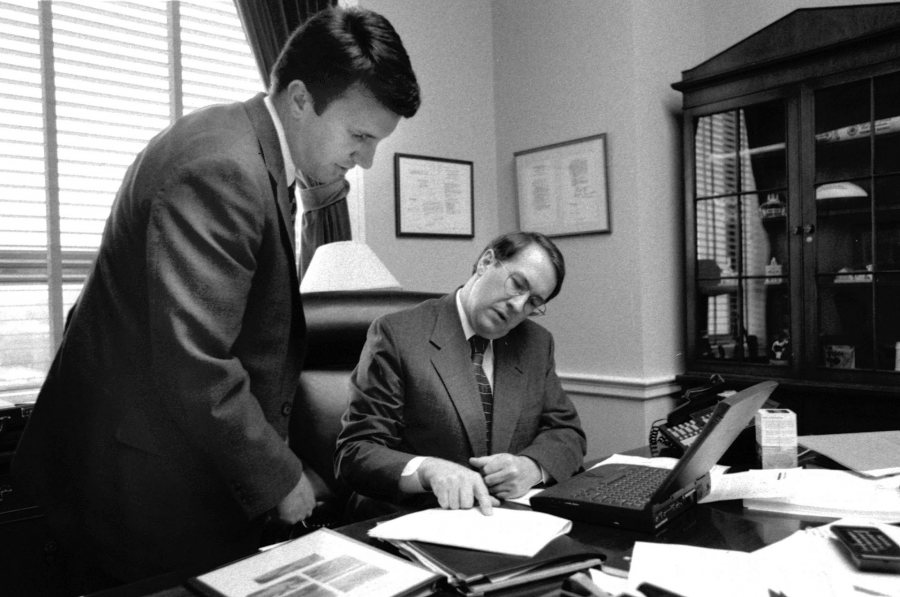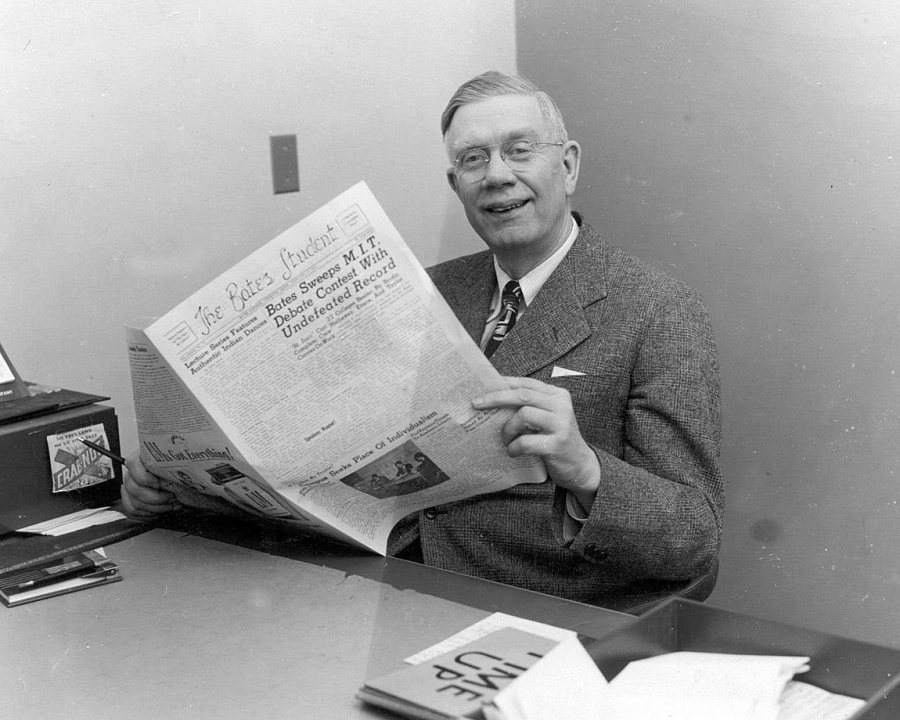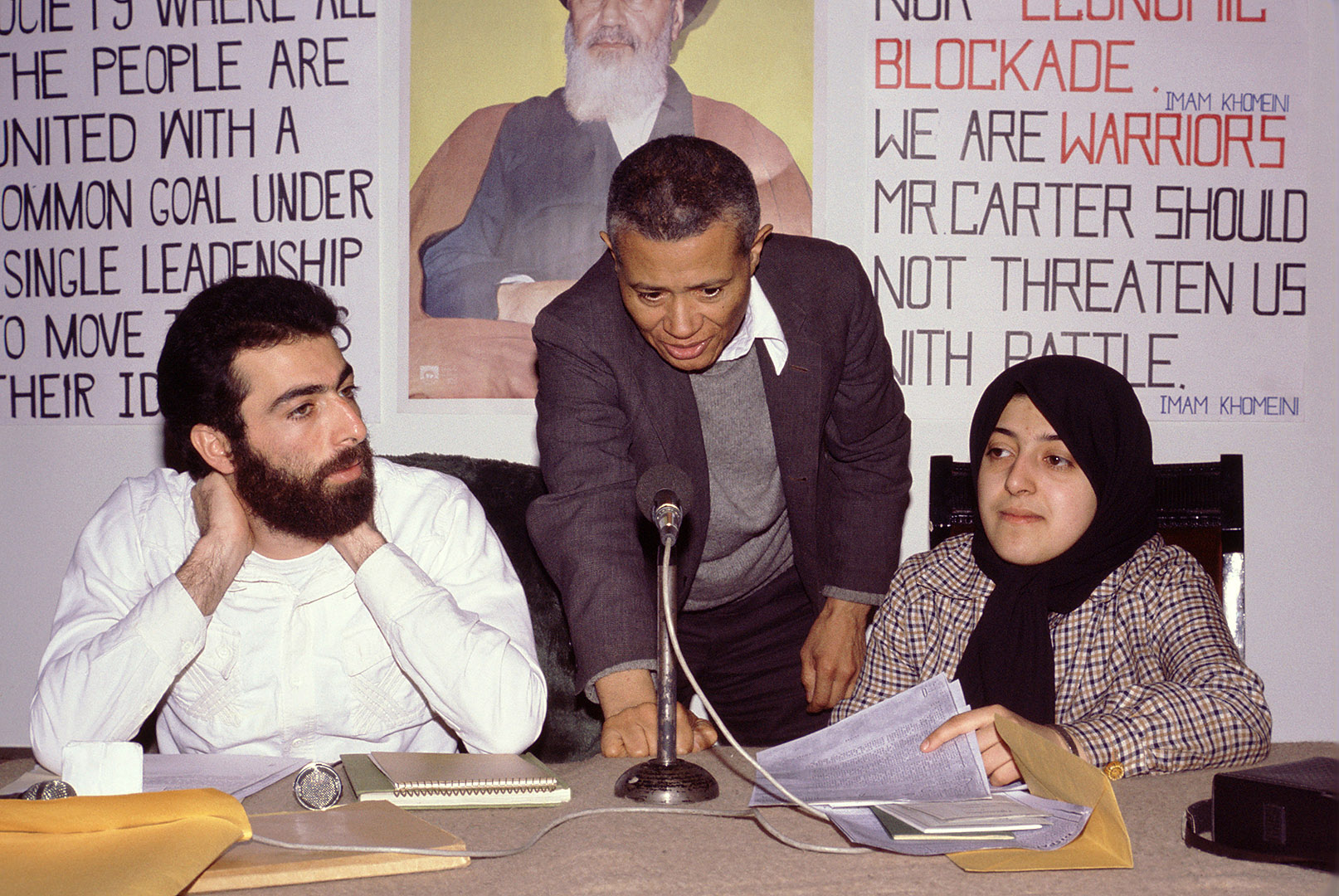
Bates in the News: Jan. 18, 2019
Jared Golden ’11, Ben Cline ’94, and Bob Goodlatte ’74
Two alumni take their seats in Congress, and a third retires
Three Bates alumni — Bob Goodlatte ’74, Ben Cline ’94, and Jared Golden ’11 — were part of the comings and goings in Washington, D.C., on Jan. 3 as newly elected congressional representatives took their seats and others left office.
Amy Friedenberger of The Roanoke Times wrote a long profile of Goodlatte, a Republican who represented Virginia’s 6th Congressional District for 26 years before retiring this year.

In July 1999, Ben Cline ’94 (left) confers with Rep. Bob Goodlatte ’74, R-Va., in Goodlatte’s office in the Rayburn House Office Building. Goodlatte’s legislative director at the time, Cline now has succeeded Goodlatte as Virginia’s 6th District representative. (Phyllis Graber Jensen/Bates College)
“There’s plenty of good work that has been done, and I’ve been honored to be a part of it, and there’s plenty of good work that can still be done,” Goodlatte said as he prepared to leave his digs (with a view of the Capitol) in the Rayburn House Office Building.
Friedenberger also covered the swearing-in of Goodlatte’s successor, Republican Ben Cline ’94. Cline spoke of working with Democrats to reopen the government.
“I do believe we can chart a new course working together on issues where we have common ground,” he said.
Meanwhile, Steve Collins of the Lewiston Sun Journal covered Golden’s arrival at the U.S. capital, noting that the 2nd District Democrat’s first days on the job were marked by a vote for Speaker of the House (for Cheri Bustos, D-Illinois); “House”-warming gifts from two fellow Maine lawmakers, independent Sen. Angus King and Democratic Rep. Chellie Pingree; and a near-car crash on the way from the airport.

Jared Golden ’11 greets his supporters at the Gendron Franco Center in Lewiston on Nov. 6. On his right is his wife Isobel Golden ’11. (Russ Dillingham/Sun Journal)
“He said he’s going to play his part in a team effort to address issues ranging from health care to campaign finance reform,” Collins wrote.
- Read: “’He was Bob’: After 26 years, Bob Goodlatte retires from Congress,” The Roanoke Times, Dec. 22, 2019
- Read: “Republicans Ben Cline, Denver Riggleman sworn in amid divided government,” The Roanoke Times, Jan. 3, 2019
- Read: “Jared Golden takes his seat in U.S. House of Representatives,” Sun Journal, Jan. 3, 2019
Lucy Brennan ’14
Town seeks to eliminate all greenhouse gas emissions by 2050 — York Weekly
The Bangor Daily News reported that the town of York, Maine, now knows it’s mostly on track to eliminate municipal greenhouse gas emissions, thanks to research conducted by AmeriCorps volunteer Lucy Brennan ’14.
Brennan, who is also the sustainability program coordinator for the city of South Portland, started out by organizing data from York’s municipal power bills. Overall, her research has shown that emissions from heating fuel, electricity, and streetlights have all gone down in recent years, but the town’s vehicle fleet remains a significant source of emissions.
The fire department has done a particularly good job — thanks in part to a solar array on its rooftop — with reducing emissions, Brennan told reporter Deborah McDermott. “There’s a really exciting story to tell here,” she said.
- Read the story: “Town seeks to eliminate all greenhouse gas emissions by 2050,” York Weekly, Jan. 8, 2019
Richard A. Johnson ’78
Black Sox scandal: SF native Thom Ross paints fresh perspective of 1919 team — San Francisco Chronicle
For a review of a new art exhibit on the infamous “Black Sox” scandal of the 1919 World Series, San Francisco Chronicle reporter John Shea spoke with Richard Johnson ’78, curator of the Sports Museum in Boston and a friend of the artist, Thom Ross.
“He gets into a subject and researches it assiduously and has a real attraction to the quintessential American stories that almost morphed into fables,” Johnson told Shea. “The Black Sox seem to fit into that mold.”
- Read the story: “Black Sox scandal: SF native Thom Ross paints fresh perspective of the 1919 team,” San Francisco Chronicle, Jan. 1, 2019
Chuck Radis ’75
Peaks Island doctor brings practice to pages in new book — The Forecaster
David Harry of The Forecaster talked to Chuck Radis ’75, an osteopath who practiced on the islands of Casco Bay for more than 30 years and has now written a book about his experiences.
Radis worked out of the Peaks Island Health Center, often reaching patients by police boat. He hopes the book will “provide historical background for some people who looked at the islands as upscale and homogeneous,” Radis told Harry.
Radis, who now practices rheumatology in Portland and has founded a nonprofit that works in a refugee camp in Uganda, still lives on Peaks Island.
- Read the story: “Peaks Island doctor brings practice to pages in new book,” The Forecaster, Dec. 31, 2018
Tom Lopez ’69
After 41 seasons — and 303 wins — Tom Lopez retires as Lincoln-Sudbury football coach — The Boston Globe
After 40 years, 303 career wins, and three Massachusetts high school football Super Bowl titles, Tom Lopez ’69 is retiring as head football coach at Lincoln-Sudbury High School.

Showing that he still has football moves, head coach Tom Lopez ’69 dodges players trying to dump water on him after his 300th career victory on Oct. 19, 2018. (MetroWest Daily News and Wicked Local Staff Photo/John Walker]
Lopez started as an assistant coach at the school in 1971 and became head coach in 1978.
“I told the kids, to coach 48 years at one place, I’ve had the best job in America,” Lopez told Boston Globe reporter Brendan Hall. “I’m leaving with a lot of smiles on my face. It’s a great place to coach, a great school, great kids.”
Lopez, who won his 300th game last October, was an outstanding end for Bates football as a student.
- Read the story: “After 41 seasons — and 303 wins — Tom Lopez retires as Lincoln-Sudbury football coach,” The Boston Globe, Dec. 19, 2019
- Related: “Lincoln-Sudbury right place for longtime football coach Tom Lopez,” The Milford Daily News, Dec. 30, 2019
Kelli Armstrong ’86
Salve Regina names Boston College administrator as next president — The Boston Globe
The Boston Globe and other media outlets reported that Kelli Armstrong ’86 will become president of Salve Regina University in 2019.
Armstrong, currently vice president for planning and assessment at Boston College, will be the first lay president of Salve Regina, which is affiliated with the Religious Sisters of Mercy.
The university has “created a wonderful educational environment that is unique in its preparation of students for lifelong learning with a moral compass,” Armstrong said in a statement. “Salve Regina has a bright, exciting future, and I look forward to working with the entire University community to advance its mission.”
- Read the story: “Salve Regina names Boston College administrator as next president,” The Boston Globe, Dec. 14, 2018
- Related: “Kelli Armstrong named eighth president of Salve Regina,” SALVEToday, Dec. 12, 2018
Brooks Quimby, Class of 1918, and Edmund Muskie ’36
How a Bates professor forged Edmund Muskie’s career — Sun Journal
After a Bates panel on the legacy of Edmund Muskie ’36, Steve Collins of the Lewiston Sun Journal dived into the college’s Edmund S. Muskie Archives to explore the relationship between the statesman and his Bates mentor: legendary rhetoric and speech professor Brooks Quimby, Class of 1918.

Rhetoric and speech professor Brooks Quimby, Class of 1918, reads The Bates Student in February 1955. (Muskie Archives and Special Collections Library)
Muskie said in a 1957 speech that Quimby, who debated at Bates as a student and returned as a coach and professor for 40 years, helped him transform from a “shy boy” into a confident, articulate speaker able to take on the 20th century’s most pressing challenges.
“Above all, (Quimby) taught us to seek fulfillment for ourselves by developing our capacity to make a contribution to the world about us,” Muskie said. “He inspired us to do so, as he still does, by his own example.”
- Read the story: “How a Bates College professor from Turner helped forge Edmund Muskie’s political career,” Sun Journal, Jan. 12, 2019
Bates College Museum of Art
Artists interpret human impact on the Earth at Bates — Portland Press Herald
Arts reporter Bob Keyes covered the Bates College Museum of Art exhibit Anthropocenic: Art About the Natural World in the Human Era.

“Watering Hole (Social Species in the Late Anthropocene),” a 2017 oil painting by Laurie Hogin, appears in the Museum of Art exhibition Anthropocenic.
“Some scientists believe we have moved past the Holocene epoch and into a new one known as the Anthropocene, an epoch defined by significant human impact on the Earth’s geology and ecosystems, including climate change,” Keyes wrote.
- Read the story: “Artists interpret human impact on the Earth at Bates,” MaineToday, Dec. 24, 2018




